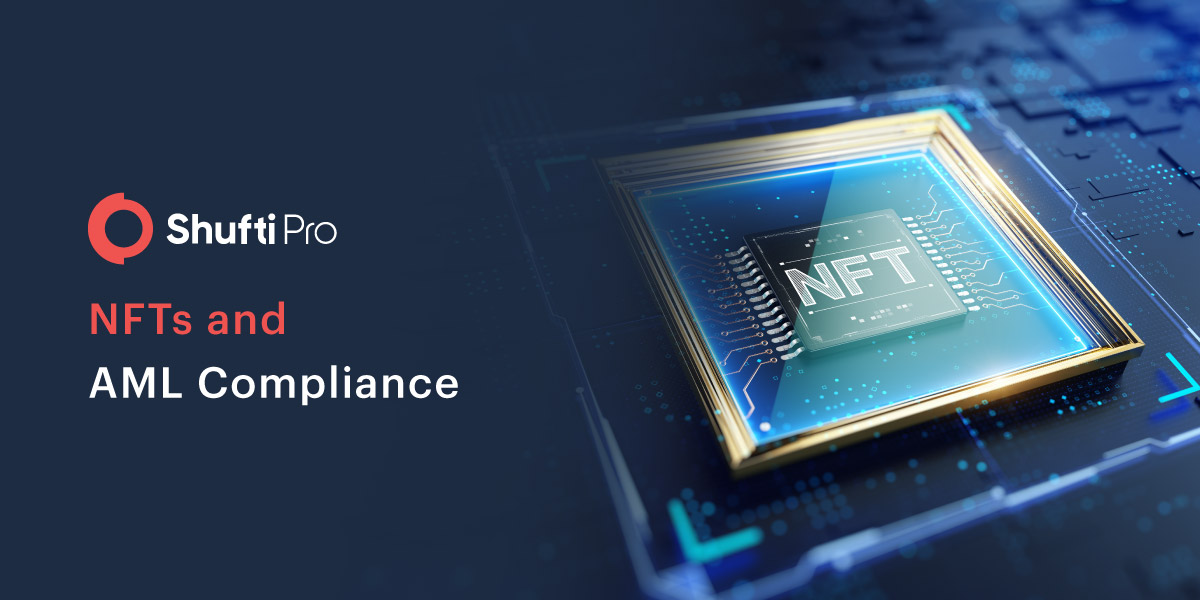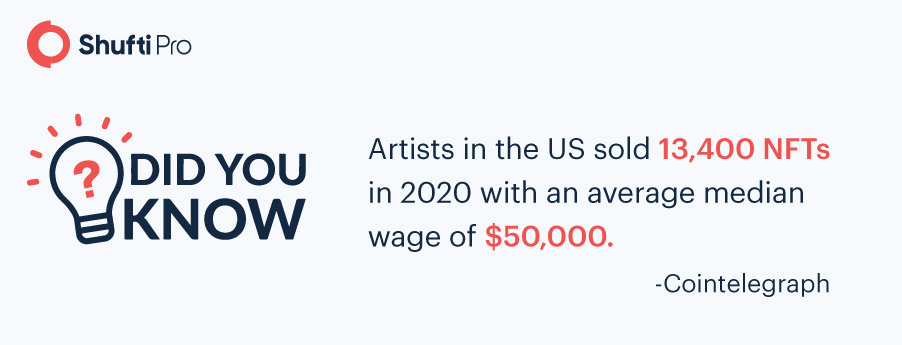From Fraudsters to Artists – The Dire Need of AML Compliance for NFTs

Over the past few years, NFTs or Non-Fungible Tokens have become popular in the crypto sector. According to Statista, 51,227 primary sales were recorded worldwide, whereas secondary sales of these assets were 38,024. However, it has become a channel in money laundering as well. Why? Since law enforcing bodies are regulating the art market, fraudsters are switching to NFTs for their illicit activities. No regulations, no Know Your Customer (KYC) or Anti-Money Laundering (AML) requirements, and anonymity makes it the perfect outlet for laundering money, identity theft and other crimes. Many cases for money laundering through these digital assets have been reported; therefore, there is a dire need for AML compliance in the NFT marketplace too.
What are Non-Fungible Tokens (NFTs)?
A wide range of tangible and intangible objects like art, in-game items, music, and videos can be represented as a digital asset called NFTs. Each NFT has units of blockchain representing an item. This item could be:
- Art
- Collectibles
- Games
- Tweets
- Licenses and certifications
- Music
- Fashion brands
- GIFs
Coindesk reveals that $174 million has been spent on NFTs since 2017.
Money Laundering through NFTs
Sounds unreal but NFTs can be used for laundering black money. They are anonymous and have no central body that governs any activity in the market, so why not keep illegally earned money as an NFT. Let’s look at an example by a former USA Today journalist to understand money laundering through NFTs better.
“If you have $1 million in illegal money, you would spend $1 million on your own NFT. You can do this yourself or use a trusted third-party account. Then you resell the trash for nothing and bank the profits.”

The Need for AML Compliance in NFT Marketplaces
Given the significant switch in channels for laundering money, the NFT space requires rigid AML rules like all other sectors. KYC and AML protocols like those of the finance sector must be enforced to non-fungible tokens as well.
Experts say that it is all rainbows and unicorns for bad actors in the NFT market but it will all end soon. When Bitcoin was first introduced, it had no laws and money laundering numbers increased rapidly. After some time, regulators jumped in to save the day. The same is going to happen with NFTs. A regulatory crackdown backed by KYC and AML laws is all set to change the game for fraudsters appearing as artists.
Suggested: Here’s to 2021 – NFTs Conquering the Crypto Market

FATF’s Stance on Regulating NFTs
The Financial Actions Task Force (FATF) issued new guidelines for virtual asset service providers (VASPs) a few months ago. Also known as the Travel Rule, the FATF has included non-fungible tokens for the first time in its guidance. Although how to execute the plans is not clear, the global regulator considers the burgeoning space a FinCrime threat until it operates without laws in an anonymous manner.
FATF and other authorities across the globe are aware of how art is being used for laundering money and tax evasion for a long time. Criminals are continuously coming up with new ways of executing their ill plans so NFTs will soon be widely used to for financial crimes.
Since digital assets can be anonymously bought and sold, the time is not far when Know Your Customer (KYC), Counter Terrorist Financing (CFT) and Anti-Money Laundering (AML) measures to combat perpetrators will be in action.
The Travel Rule suggests that non-fungible tokens must be considered as Virtual Assets (VAs) depending on the method they are traded on secondary markets.
How Can Shufti Help?
Shufti’s AI-driven AML solution is perfect for the emerging NFT space. Within 30 seconds, the marketplace can make sure legitimate people are issuing digital assets. The identity of every individual is screened against 1700+ global watchlists. Furthermore, the verification results are 98.67% accurate and stored in our back-office for later use.
Apart from Anti-Money Laundering (AML) screening, the FATF also suggests businesses to employ Know Your Customer (KYC) solutions for more efficiency in the customer onboarding process. The remote identity verification solution has seven comprehensive steps that take less than a minute to complete.
- End-user registers on the marketplace
- End-user and KYC expert get in touch on a live video call
- End-user is interviewed for liveness detection
- End-user shows government-issued identity document during the call
- The ID document is verified for forgery and tampering
- Face of the end-user is matched with the photo on the ID document
- Verification results are delivered and stored in the back-office
This is how easy it is to remotely verify any client in the NFT marketplace using video KYC.
Recommended: Video KYC – Understanding the ‘what’ and ‘how’ [A short guide]
Key Takeaways
All in all, the rising NFT space is becoming the new target of financial criminals. Money launderers are hiding illegally earned money in the form of non-fungible tokens making it nearly impossible for anyone to trace. The identity is hidden and these digital assets are transferable. The lack of regulations is another major reason behind the rise in FinCrime through NFTs. The FATF issued guidance on the virtual asset service providers and for the first time non-fungible tokens are also a part of the global regulator’s guidelines.
Experts are predicting that the NFT space will be regulated soon and KYC/AML requirements will be fundamental for the marketplace. Robust Know Your Customer (KYC) and Anti-Money Laundering (AML) screening will become essential.
Want to know more about KYC/AML compliance for NFTs? Get in touch with our experts.

 Explore Now
Explore Now













